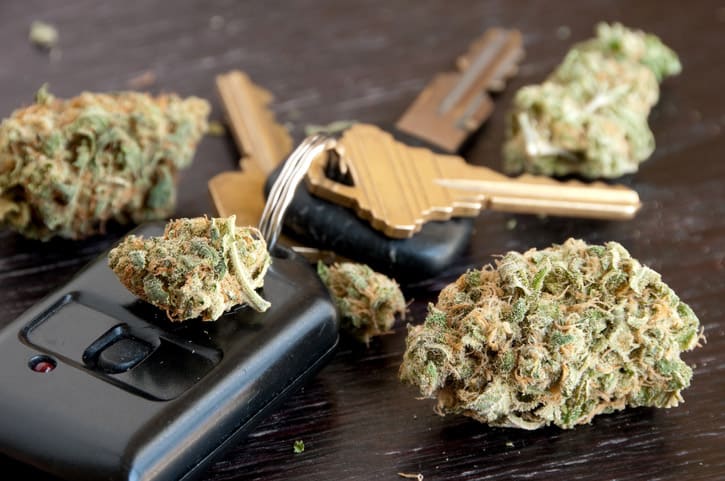Colorado Marijuana DUI
Marijuana is legal in the State of Colorado. In 2013, Colorado adopted its 64th state amendment, legalizing the medicinal, industrial, and recreational use of marijuana.
You may lawfully use marijuana for medical or recreational purposes. In the years since legalization, how has marijuana affected Colorado DUI laws? Here’s what you need to know from skilled Denver car accident lawyers.
How Has the Legalization of Marijuana Impacted Car Accidents in Colorado?
The legalization of marijuana has increased the overall number of car accidents in the State of Colorado. The Insurance Institute for Highway Safety Highway Loss Data Institute reports a six percent increase in Colorado car accidents since the legalization of marijuana. However, there has been no significant impact on the number of fatal accidents. The Colorado Department of Transportation reports 68 fatal accidents in 2015 in which the driver tested positive for cannabis. There were only 35 cannabis-related fatal accidents in 2017.
The increase in the number of accidents statewide is significant. With tens of thousands of accidents each year in Colorado, a six percent increase means thousands more crashes. However, the fatality rate for marijuana-related accidents has remained steady both before and after the legalization of marijuana.

How Many Arrested for DUI for Marijuana Use Colorado
Of the 27,000 people arrested for DUI in Colorado in 2017, 15 percent of cases, or 4,050 arrests, were marijuana-related. Seven percent of cases were exclusively marijuana-related. That means approximately 1,890 DUI arrests in the State of Colorado involve just marijuana while an additional 2,160 arrests involve marijuana and at least one other substance.
Have DUI Marijuana Arrests Increased in Colorado Since the Legalization of Marijuana?
No, DUI marijuana arrests have not increased in Colorado since the legalization of marijuana. The number of marijuana DUI arrests has remained steady from before the time that marijuana became legal in the state. This is despite the fact that more officers than ever before are trained as Drug Recognition Experts to recognize the signs of marijuana use while conducting a DUI investigation.
How Does Colorado Prove a Marijuana DUI
To prove a marijuana DUI, Colorado authorities rely on a combination of witness observation and scientific evidence. Law enforcement must prove that the driver was under the influence of marijuana, that marijuana impaired their ability to drive or that the driver was over the legal limit for the presumed influence of marijuana.
Law enforcement typically relies on witness testimony about driving, witness observation of the condition and behavior of the driver, and scientific evidence like a blood test to prove the case.
Colorado DUI Statistics Since Legalization
Colorado DUI statistics since legalization show that marijuana-related DUI arrests have remained steady at 7 percent of all DUI arrests. About 15 percent of all DUI arrests in the State of Colorado involve marijuana in some way, including with alcohol or another drug. Approximately 7 percent of all DUI arrests involve only marijuana. Overall, DUI arrests for all substances have slightly decreased since marijuana legalization.
Colorado Marijuana DUI
A Colorado marijuana DUI is based on one of three scenarios:
- The driver is under the influence of marijuana at the time of driving
- Use of marijuana impairs the driver’s ability to drive
- The amount of active marijuana in the driver’s blood is over the legal limit for DUI (5 nanograms in Colorado)
The potential penalties for drug DUI in Colorado is the same standard for alcohol-related DUI. A first-time drug DUI offender faces the same penalties as someone arrested for DUI-alcohol. Repeat offenders face the same enhancements that anyone charged with DUI faces. A driver might face a habitual offender charge for DUI even if their previous DUI was for a different substance.
Legal Limit for Driving High in Colorado
In Colorado, the legal limit for driving high is five nanograms (ng) of the active ingredient of marijuana. THC, the mind-altering compound in cannabis, is a poor indicator of intoxication. THC is fat-soluble, meaning that it’s stored in your fat, unlike alcohol, which is water-based. At five ng, the law presumes that you’re under the influence of marijuana.
However, you may still be convicted of driving while high if there is any amount of the active ingredient in your system. Heavy marijuana users build up more THC in their systems, which could create a false positive in marijuana intoxication tests. Occasional users’ systems could be THC-free in a matter of hours.
Law enforcement just has to show how the drugs influence your ability to drive. However, if you have five ng or more of active marijuana in your system, Colorado law presumes that you are under the influence of marijuana.
How Colorado Tests Marijuana DUI
For a Colorado marijuana DUI test, the state performs a blood test. The blood test is the primary test for marijuana use. In addition, a trained officer may perform a series of tests on the side of the road. The tests may include things like looking at your pupil movement and coordination tests. An officer should be formally trained in how to conduct a marijuana DUI investigation.
A Drug Recognition Expert is an officer who is trained to conduct DUI tests for marijuana. The standard field sobriety tests for marijuana were developed to work only for alcohol. They have not been verified as accurate for marijuana DUI investigations. If you’re charged with marijuana DUI, it’s essential to evaluate the investigation to determine if the officer had the proper training to investigate a marijuana DUI and if they followed protocols.
Marijuana DUI Lawsuits
Even though marijuana is now legal in the State of Colorado, the laws surrounding marijuana DUI lawsuits have not changed. If you’re the victim of a marijuana DUI, you may bring a claim for financial compensation against whoever is determined to be at fault for the accident. The standard for legal liability is negligence.
The definition of negligence is not using the ordinary amount of care that a reasonable person would use in the same situation. Whether or not marijuana is legal for medicinal or recreational use, when someone drives while they’re under the influence of marijuana, they’re acting negligently. When you get hurt as a result, you may demand compensation for your physical injuries, lost work, pain and suffering, and more.
Contact our Denver Car Accident Lawyers
Are you the victim of a DUI involving marijuana? You have rights. Even if the state files a criminal case, there are important reasons to bring a civil claim for compensation.
At Bachus & Schanker, LLC, we fight for the rights of accident victims. Our team can help you evaluate your case and take all of the necessary steps to win the financial compensation that you deserve. Call us today for a complimentary consultation about your case.






